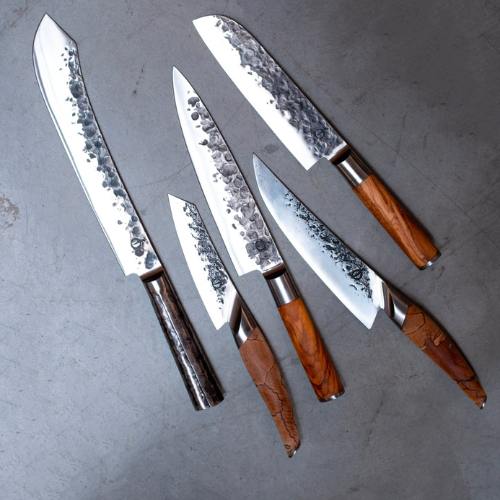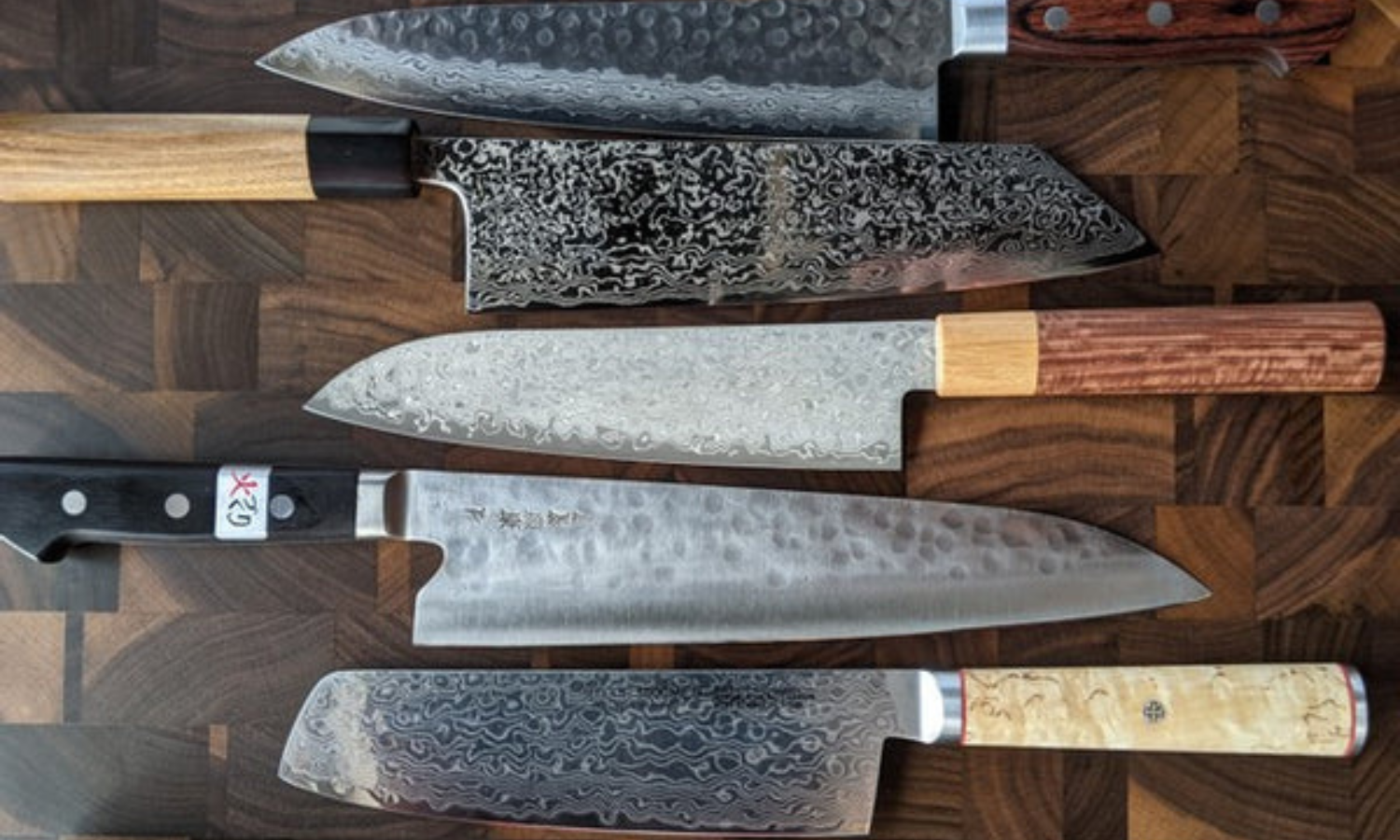If you’re passionate about cooking or a professional chef, you understand the importance of having the right tools in your kitchen. Among the various culinary instruments, a knife plays a vital role in ensuring precision and efficiency. When it comes to knives, you may have heard the term “forged knife” being thrown around.
In this article, we will delve into the world of forged knives, exploring their definition, unique characteristics, advantages, and much more. So, let’s embark on this culinary journey and unravel the secrets behind the artistry of forged knives.
What is a Forged Knife?
A forged knife refers to a type of knife that is made by shaping and molding the metal through a process known as forging. Unlike stamped knives, which are cut out from a sheet of metal, forged knives are created through a method that involves heating the metal and then shaping it using a hammer or a press. This traditional and time-honored technique ensures the blade is stronger, more durable, and of higher quality.
The art of forging knives dates back centuries, where skilled artisans and blacksmiths meticulously crafted these culinary tools. The process involves heating the metal, typically steel, to a high temperature and then hammering it into shape. This method not only aligns the grain structure of the metal but also eliminates any imperfections, resulting in a blade with superior strength and resilience.

Characteristics of Forged Knives
Forged knives exhibit several distinctive characteristics that set them apart from other types of knives. These characteristics contribute to their exceptional performance, durability, and overall value. Let’s explore some of the key attributes of forged knives:
Strength and Durability:
The forging process enhances the strength and durability of the knife blade, making it less prone to chipping or breaking during heavy use. The compact and aligned grain structure achieved through forging creates a robust knife that can withstand rigorous cutting tasks.
Balance:
These are renowned for their excellent balance, which ensures optimal control and maneuverability. The weight of the blade is distributed evenly, allowing for comfortable and precise cutting motions.
Sharpness:
The forged blade’s edge can be honed to a razor-sharp edge, enabling clean and effortless cuts. The superior sharpness of forged knives contributes to their ability to retain their edge for a longer time, reducing the need for frequent sharpening.
Weight:
Compared to stamped knives, forged knives tend to have more substantial weight due to the higher density of the metal. This added weight provides a sense of stability and control, allowing for smoother and more efficient cutting.
Versatility:
These are available in a wide variety of shapes and sizes, making them versatile tools for various culinary tasks. From slicing and dicing to chopping and mincing, there’s a forged knife suitable for every purpose in the kitchen.
Aesthetics:
The artistry of forging adds an aesthetic appeal to the knives. The hammered texture on the blade, along with the intricate detailing on the handle, gives forged knives a unique and visually appealing look.
Advantages of Forged Knives
Choosing a forged knife for your culinary adventures offers numerous advantages that enhance your cooking experience and elevate your results. Let’s explore some of the benefits of using forged knives:
Superior Cutting Performance:
The strength, sharpness, and balance of forged knives result in superior cutting performance. Whether you’re slicing through delicate ingredients like herbs or tackling tougher tasks like cutting through bones, a forged knife will make the process smoother and more efficient. The precision and control offered by a well-crafted forged knife allow for cleaner cuts, ensuring that your food retains its texture and flavors.
Long-lasting Durability:
Investing in a forged knife means investing in a long-lasting kitchen tool. The meticulous forging process creates a blade that is highly resistant to wear and tear, making it more durable than other types of knives. With proper care and maintenance, a forged knife can serve you for a lifetime, saving you the hassle of constantly replacing worn-out knives.
Enhanced Safety:
The sturdy construction and excellent balance of forged knives contribute to increased safety during food preparation. The secure grip and stability provided by a well-designed handle minimize the risk of accidents and ensure that you have full control over the knife while cutting. This aspect is particularly crucial for professional chefs who spend extended periods in the kitchen.
Efficiency in the Kitchen:
The superior cutting performance and durability of forged knives translate into enhanced efficiency in the kitchen. With a forged knife in hand, you can accomplish your tasks quickly and effortlessly, saving valuable time and energy. The sharpness and precision of the blade allow for smoother and more accurate cuts, enabling you to achieve consistent results in your culinary creations.
Professional Grade Quality:
These are widely favored by professional chefs and culinary experts due to their exceptional quality. The craftsmanship and attention to detail that go into creating a forged knife make it a professional-grade tool that meets the rigorous demands of commercial kitchens. By choosing a forged knife, you bring a touch of professionalism to your own culinary endeavors.
Prestige and Tradition:
These have a rich history and carry a sense of prestige and tradition. The art of forging knives has been passed down through generations, and by using a forged knife, you become part of this timeless tradition. Additionally, the beauty and craftsmanship of forged knives make them prized possessions for culinary enthusiasts and collectors alike.
FAQs About Forged Knives
Are forged knives more expensive than other types of knives?
Yes, forged knives tend to be more expensive due to the labor-intensive process involved in their creation and the high-quality materials used.
Can I sharpen a forged knife at home?
Absolutely! With the right tools and proper technique, you can sharpen a knife at home.
Can I use a forged knife for all types of cutting tasks?
Yes, forged knives are versatile tools suitable for a wide range of cutting tasks. It’s important to choose the right type of forged knife for specific tasks.
How often should I sharpen a forged knife?
As a general guideline, it’s recommended to sharpen your knife every few months with regular use. However, keep in mind that a well-maintained and properly honed knife will retain its sharpness for a longer time.
Bottom Line
A forged knife is a culinary masterpiece crafted through the art of forging. Its superior strength, durability, balance, and sharpness make it an invaluable tool in the kitchen. Choosing a forged knife not only elevates your cooking experience but also ensures precision, efficiency, and long-lasting performance.
Whether you’re a professional chef or an enthusiastic home cook, investing in a forged knife is a testament to your passion for culinary excellence. So, why settle for anything less when you can wield a finely forged blade that embodies tradition, craftsmanship, and the essence of culinary artistry?
